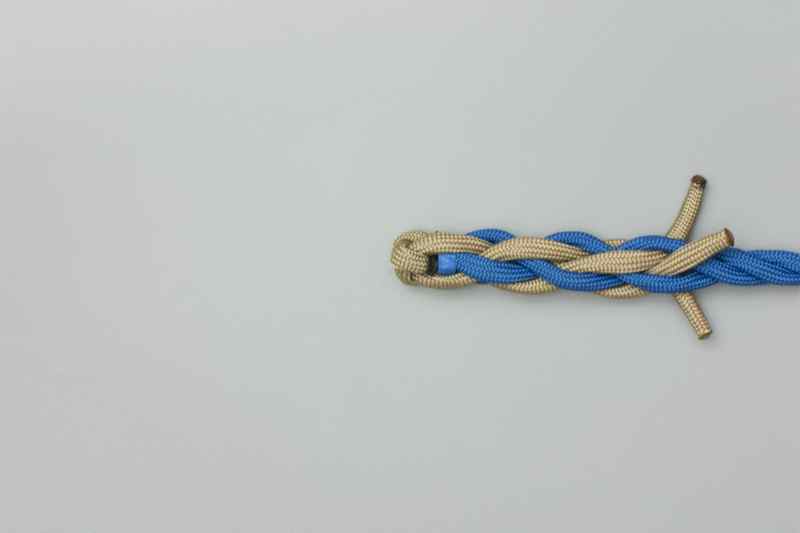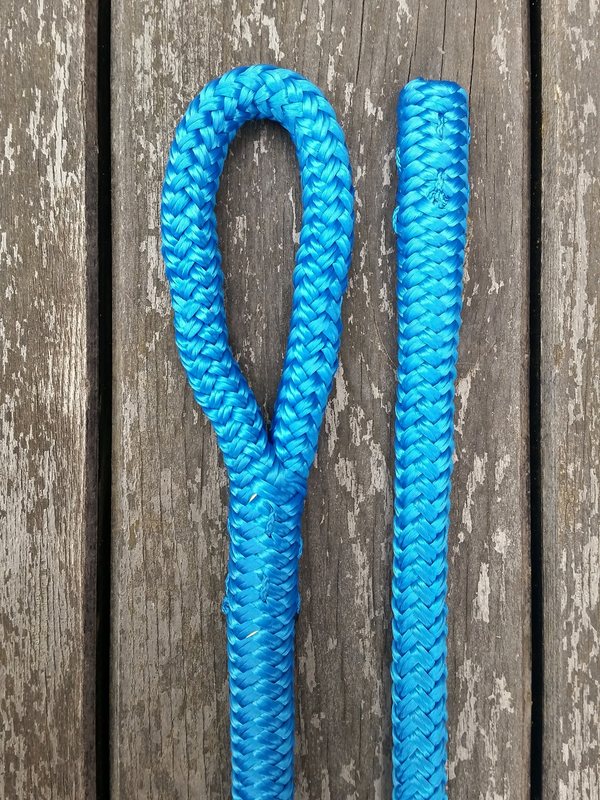How to Back Splice a Rope
3-Strand Back Splice. Class 1 3-strand ropes are made from any or all of the following fibers: Olefin, Polyester, Nylon. Although the 3-strand splice is the most common splice, and simple to perform, technique is important to preserve splice strength. Take care that the tucks lie neatly; rope strength can be lost if the strands are twisted.

How to Splice Rope (with Pictures) wikiHow
Back splice (or end splice) - A splice where the strands of the end of the rope are spliced directly back into the end without forming a loop. It is used to finish off the end of the rope to keep it from fraying. The end of the rope with the splice is about twice the thickness of the rest of the rope.

A beginner's guide to splicing ropes RopesDirect Ropes Direct
strands back to bitter end and remove tape from the bitter end. After taper is complete hold rope at neck of splice and smooth cover until taper disappears. NOTE: The rope may be too tight to bury before tapering, if so per-form step 4 before steps 2 & 3. Figure 2 Step #2 To mark the tuck points in the area between points "B" and "C"

How to back splice a 4 strand rope using a fid YouTube
There are a wide range of rope splicing techniques to choose from (e.g. back splice, end-to-end splice, brummel splice etc.) - all of which are designed to create a neat rope end finish, without affecting the strength of the rope itself. However, the most common is the eye splice. This is the splicing method offered here, at RopesDirect.

Back Splice 3 Strand Rope Easy to Follow How to Back Splice a Rope YouTube
Back in the days of weak chain and hemp rope, a two-strand splice was developed to allow bulky rope to fit through a link. The Two-Strand Splice In a two-strand, long chain splice, one strand is unlaid far back up the rope and the remaining two strands are fed through the link in opposite directions, lying flat and sharing the load evenly.

Back Splice How to tie a Back Splice using StepbyStep Animations Animated Knots by Grog
Back splices work exceptionally well at preventing the end of a rope from unraveling. It secures the end of the rope into itself and makes sure that none of the strands can work their way loose and fray. A back splice is simply a splice where the end of the line is doubled back on the line itself, tucking its ends back into the line.

Tutorial Tips How to back splice rope very easy to learn,step by step YouTube
To back splice: 1. Unlay the rope for three times its own circumference. 2. With the strands form a Crown Knot. 3. Tuck the strands back along the rope as for a Short Splice (Fig. 63). To work a Cringle into a Rope or Sail. A Cringle is a small becket or loop (see Fig. 64a). 1. Take a strand of rope three and a half times the length of becket.

How to back splice a rope Artofit
The end of the rope with the splice is about twice the thickness of the rest of the rope. With nylon and other plastic materials, the back splice is often no longer used; the rope strands are simply fused together with heat to prevent fraying. A cut splice. cut splice (originally called cunt splice) - A splice similar to the eye splice. It is.

4 Ways to Splice Rope wikiHow
2 step extracting the core Bend rope sharply at Point X. With pusher or any sharp tool such as an ice pick, awl, or marlin spike, separate cover strands to expose core. First pry, then, pull core completely out of cover from Point X Prying out the core to the taped rope end. Put 1 layer only of tape on end of core.

"Easy To Follow" How To Tie An Eye Splice In 3 Strand Rope YouTube
Back Splice or Crown Splice Description:The Back Splice provides a secure method of preventing the end of a rope from fraying.The back splice starts with a C.

Back Splice How to Tie a Back Splice YouTube
http://www.animatedknots.com/backsplice/Back Splice - Learn how to tie the Back Splice in a simple step-by-step video. By AnimatedKnots.com - the world's #1.

howto splice a rope YouTube
0:00 / 4:30 There are a lot of ways to finish the end of a rope, to keep it from fraying. This is an elegant and classy way to finish a hemp or cotton rope. Try it on ot.

Back Splicing 10mm, 3strand Nylon Rope YouTube
Splicing Knots Choose a knot below, or scroll down for more information: Adjustable Sling: push end through appropriate loop. Secures end of twisted rope: Crown knot & tuck the ends. Create a secure, locked eye splice in a hollow braid rope. Demonstration of the Brummel Eye Splice Structure Securely attaches three-strand rope to anchor chain

Splicing Rope SCOUT PIONEERING
P.W. Blandford: Rope Splicing Page 7 CHAPTER 2. THE BASIC SPLICES. There are four common splices: back, eye, short and long. These are most frequently used and they form the basis of many of the other splices. Back Splice. - This is the simplest splice (Fig. 3). It is a means of preventing the end of a rope fraying,

International Guild of Knot Tyers Surrey Branch 10 Back Splice 3 Strand Rope
Starts a Back Splice; part of several decorative knots. 4 To Step use Arrow Keys ( ). Set Speed using 1 - 5. Spread out the strands. Choose one strand and, continuing around in the direction of the rope's twist, lay it across its neighbor. Repeat with that strand. Repeat with the remaining strand tucking it under the first.

Lead rope with loop and back splice 10 mm Pilgrimsrep
Uses: The Back Splice ( ABOK # 2813, p 462) provides a secure method of preventing the end of a rope from fraying. The Crown Knot Structure: The back splice starts with a Crown Knot to redirect the strands back towards the standing end. The splice is completed by braiding the ends back into the standing strands.